Newborn Skin Peeling:
Causes & Treatment
Worried about newborn skin peeling? Your baby’s body (including skin) undergoes a lot of changes once it arrives in this world. Dry and peeling skin is one of them. Parents can be petrified when they see their little one’s skin peeling off his hands, head, or face. You do not need to be if you understand why this happens and how to treat it safely and immediately, with or without a visit to the doctor.
Is Newborn Skin Peeling Normal?
Newborn skin peeling is perfectly normal in newborns, for the first few weeks. It is the outer layer of skin that sheds naturally after birth. It can be discomforting for the parents to look at, but it is nothing to worry about!
Babies have spent the last 9 months in the protective liquids of their mother’s womb. Once they get exposed to dry air, it starts showing on their skin, whilst they make this all-important transition.
This peeling off old skin leads to the creation of a new layer of skin that is more attune to this new environment. This newer layer is meant to be more resilient to withstand the outside conditions.
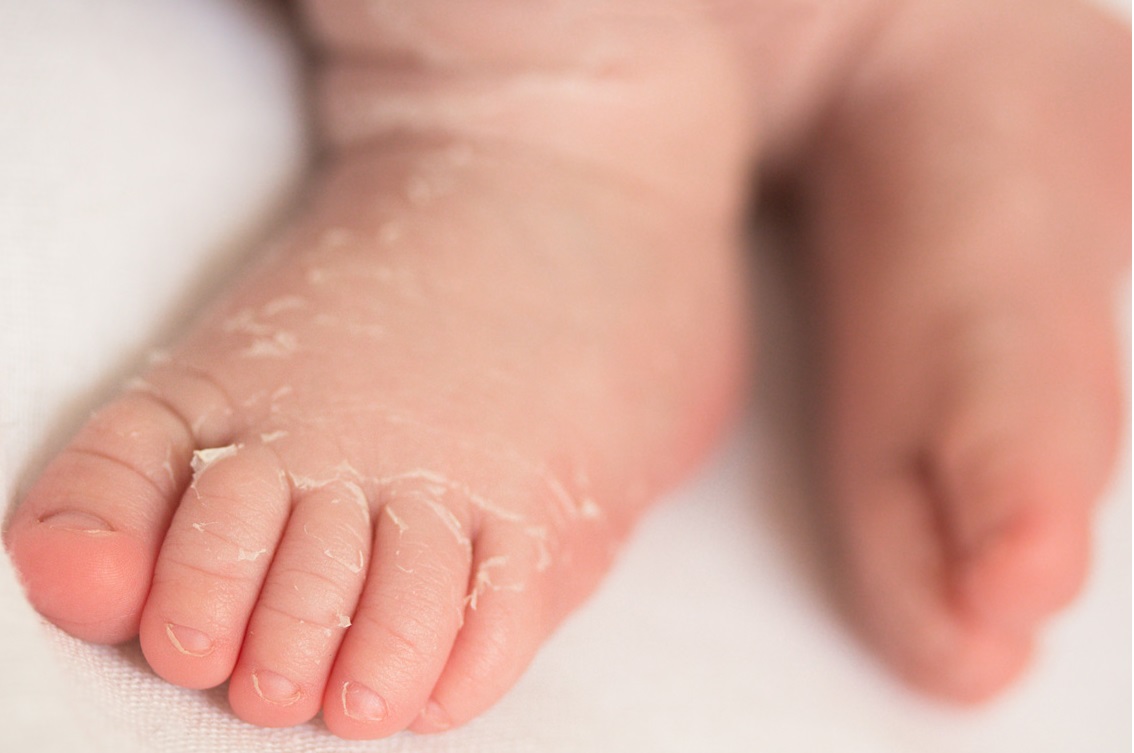
Causes of Newborn Skin Peeling
During pregnancy, the baby is kept safe and secure in her mother’s womb with amniotic fluid.
After the 5th month of pregnancy, a thin layer of wax (vernix) is formed on the outer layer of the baby’s skin. The reason for its formation is not known for sure, but it is frequently labeled as a natural lubricant, protective anti-bacterial layer, and even a safety mechanism for the child.
Regardless, it gets peeled off a few weeks after the birth. You may still notice some of it left behind in the creviced skin areas, such as armpits or in between toes. This is perfectly fine and nothing to be concerned about. You shouldn’t try to forcefully remove or wash it. They should be allowed to fall off or fade away naturally.
The newborn’s skin is soft, delicate, and sensitive. It is susceptible to irritation and rashes easily. Add to that the fact that it has stayed in a fluid for the past nine months, and then suddenly exposed to dry air. Peeling is hence a natural phenomenon, bearing all the above in mind.
Is Newborn Skin Peeling Painful?
Skin peeling is not a pleasant sight, particularly on small beautiful bodies of newborns! A general concern amongst parents is that skin peeling may be painful or discomforting to their newborn, particularly on the face, hands, and the foreskin.
The answer is that it isn’t painful at all and you do not need to rush to the doctor – it is just a natural (and necessary) process that shows your baby is trying to adjust and acclimatize to the new environment they found themselves in!
The little ones do not even notice or cannot even feel the flaky or peeling skin. However, this doesn’t mean that you do not need to treat it or take care of it, on a routine basis. Itchy, red, overly dry, or scaly skin may suggest a skin condition, in which case, you may need to see a doctor.
Treatment for Newborn Skin Peeling
Here are some simple tips to help you protect your baby’s skin and reduce dryness and peeling. The ultimate aim of the treatment is to make the baby comfortable, in any way possible.
Bath Time & Skincare Products
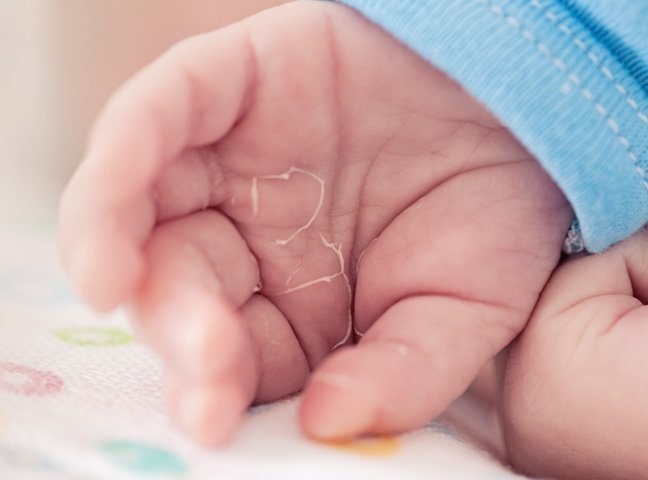
Prolonged exposure to water can lead to the removal of natural oils from your baby’s skin. 5-10 minutes would be a reasonable time, as opposed to 20-30 minutes. Frequent soap and bubble baths are not good, as they can have a harsh impact on your baby’s skin.
Only use fragrance-free and soap-free cleansers and always check with the doctor for any recommendations. Skincare products made from natural ingredients are the safest bet. Always use lukewarm water (instead of hot or cold). A water temperature of 100° F is what you should be aiming for.
Avoid Cold Wind & Air
Whenever you take your child outdoors, always ensure that their skin is properly moisturized and not exposed to dry and cold air outside. Always cover them properly with good seasonal clothing and mittens, ensuring their hands and feet are covered too. You can also use a blanket to cover the little one’s car seat or carrier when on the move.
Humidifier
If you feel the air within your home is dry, then try using a cool-mist humidifier to increase the moisture levels. This will help with your baby’s eczema and dry skin conditions.
Baby Moisturizer
A good hypoallergenic moisturizer, that is appropriate for kids, is the best solution to dry skin. This should be applied at least twice daily and compulsorily after baths.
When you apply moisturizer to the baby’s skin after the bath, it stays locked in the skin. This makes the baby’s skin soft and supple. A gentle massage of cream or lotion onto your baby’s skin can counter flaky skin and facilitate peeling.
Another good way to moisturize and overcome your newborn skin peeling condition is by adding a few drops of bath oil to the water, before bath. This will keep your baby’s skin soft and moisturized after the bath, and also neutralize any harsh chemicals from the bath if you happened to use any skincare products that aren’t naturally sourced. Just be careful with your movements and whilst handling the baby, as the tub gets slippery when you use oil.
Right Clothing
Never give in to the urge of washing your baby’s clothes with the same harsh and strong detergents that you use for yours. Baby’s clothing should be washed in mild and baby-friendly laundry detergents.
What your child wears on a routine basis or when going out is also equally important. Baby clothing should always be soft and made from gentle fabric that will not rub or irritate the newborn's peeling skin.
Avoid tight clothing that can cause irritation and rashes, or breathing difficulty for the baby.
For cold weather conditions, always layer them properly with several thin layers, as opposed to one or two heavy layers. The thought process behind this is that the babies can feel hot or cold fairly quickly, so you should be able to dress them down or add to the layers, as and when baby needs. This will keep them happy and content, and not exacerbate their peeling skin due to adverse temperatures.
There may be irritants on new baby clothing. These should be washed properly before being worn by your baby (if he/she has peeling skin condition). The same holds for sheets, bibs, towels, etc.
Baby Skincare Products
One cannot emphasize enough on the importance and utility of good quality and naturally sourced (hypoallergenic) baby skincare products – let it be cleansers, shampoos, moisturizers, or detergents. Look out for chemicals or products that have harmful chemicals in them and are an irritant, and will inflame your baby’s sensitive skin. For example, when heading outdoors, only use mineral sunscreens as opposed to the regular ones.
Keep Hydrated
Lack of hydration has a direct impact on the dryness of the skin. With hydration, we mean breast or formula milk. No baby should be drinking any water at least until they attain the age of 6 months or so, and upon doctor’s advice.
When To Visit A Doctor ?
Even though newborn skin peeling is perfectly normal, in certain rare cases you do need to take your child to the doctor.
If you notice (on a prolonged basis) redness in the skin, or when the skin is scaly, cracked, and itchy, then you must visit your baby’s pediatrician immediately.
We have put together below some of the most common skin conditions that your newborn may encounter. Some of them would require an examination and treatment by a doctor.
Ordinary Rash
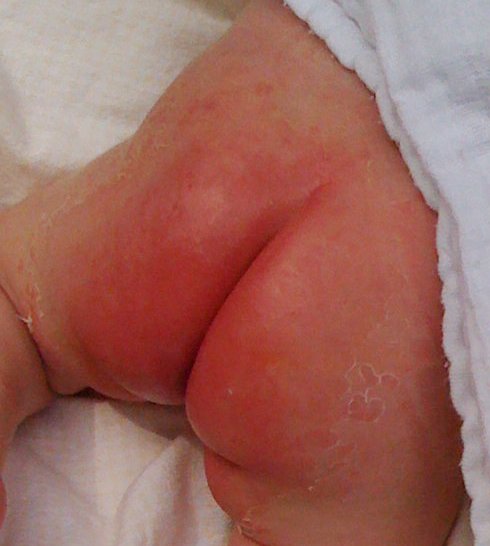
Newborn rash can be caused by several factors – diaper, pet dander, or even tree pollen.
Another common cause of rash (on wrists, armpits, neck, or ankles) can be linked to excessive layers of clothing in a hot environment or weather condition.
All of the above are completely normal and usually fade away in a few days. It is the parent’s responsibility to assess whether it is severe enough to go to the doctor. For example, if the rashes are growing in size or thickening in color, then it may well mean that you should get them checked by an expert.
Eczema - (Atopic Dermatitis)
Newborn eczema is any inflammation (or red spots) that lead to dry and itchy skin. This skin condition is neither life-threatening nor contagious to anyone.
If the spots are bright red, it is probably a good idea to get them checked by a doctor. He may prescribe you specific products that are well-suited to babies, as part of the baby eczema treatment.
If your baby has eczema, then always be cautious about the clothing you put them in. Itchy or rough textures may cause eczema conditions to flare up. That is the last thing you want! Read more on eczema and its treatment here...
Baby Acne
So it is not only teenagers who are prone to acne. Newborns can develop them too! Like in any acne case, baby acne also involves small, oily, and red bumpy skin.
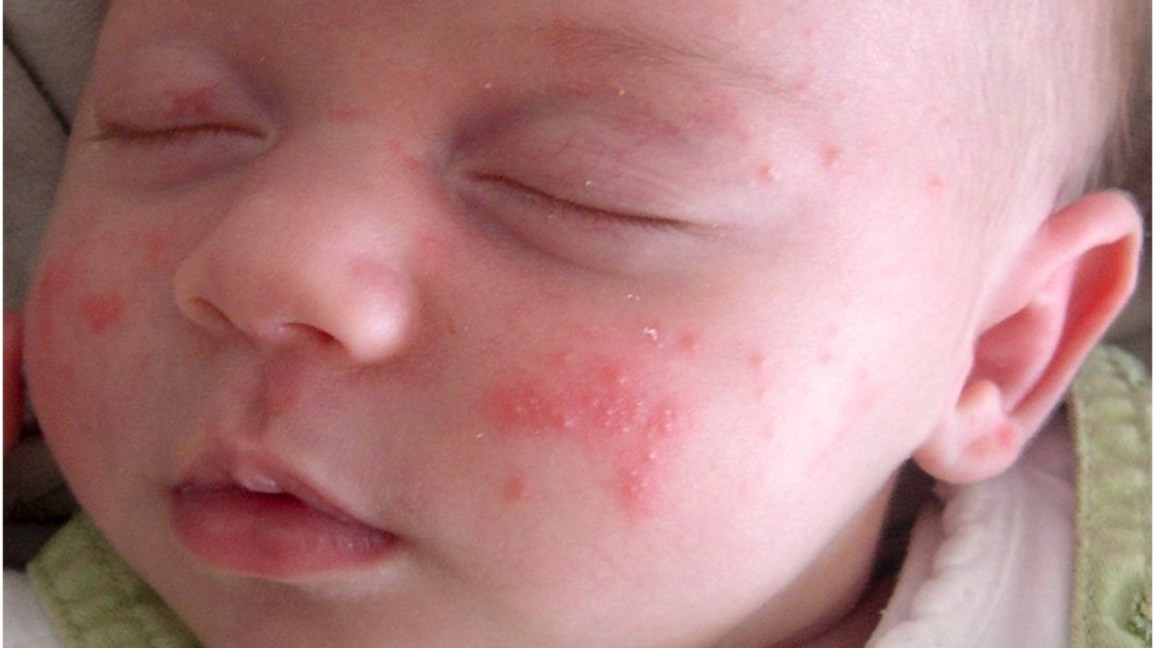
We still do not know the cause of acne in babies. There are multiple speculative theories associated with it, such as a pro-biotic imbalance, hormones in mom’s breast milk or reaction from formula milk, and even medication.
It isn’t a dangerous newborn skin peeling condition at all and there is nothing to worry about. It is commonly treated by applying gentle cleanser, breast milk (topically), and covering their hands with mittens to avoid any accidental scratches.
Never use rough towels or any cloth or stuffed toys that have an itchy or rough texture. If the acne persists for long, then you should get an appointment with a pediatrician.
Cradle Cap - (Seborrhoeic Dermatitis)
Cradle cap is a skin condition that causes red, greasy, itchy, scaly patches, and inflamed skin. This is not harmful though but caused due to lack of proper hygiene. This usually goes away by itself during the first year.
You can treat a cradle cap quite similar to newborn skin peeling. Try using humidifiers at home, minimize bath times, use baby oil and shampoo that are unscented and made out of natural ingredients. (Click here to learn how you can easily make your own baby-wipes at home.)
Congenital Ichthyosis
Ichthyosis (also known as fish scale disease) is a rare genetic disorder that can lead to thick and scaly skin in newborns, akin to fish scales. Ichthyosis comes in different forms with corresponding severity and symptoms.
This is not easy to spot at times, as all newborns have peeling and scaly skin at the time of birth and continue to be so for the first few weeks.
If you notice dry, cracked, and scaly skin that doesn’t seem to be getting better, then always visit a doctor and get a proper diagnosis regarding your newborn's skin peeling.
Frequently Asked Questions (FAQs):
What can I put on my newborn’s peeling skin?
Always rely on safe and natural baby skincare products (avoiding chemicals), to keep your little one’s skin hydrated. In particular, ensure the following:
(a) avoid long baths and whenever you give one, try the oatmeal bath that can be soothing;
(b) frequently apply a hypoallergenic moisturizer;
(c) avoid exposure to cold and dry air;
(d) use a humidifier (if required); and
(e) keep hydrated with formula or breast milk.
Is it normal for a newborn’s skin to peel?
Nearly all newborn babies will have dry and peeling skin for the first few weeks – so this is normal. This is particularly noticeable when babies are born slightly later than the expected due date.
How can I moisturize my newborn’s skin?
Hypoallergenic moisturizers will be the best choice to counter newborn skin peeling and specially dry skin. This should be done as frequently as possible, but at least twice a day, and certainly after bath time. The moisture gets locked into the skin after bath and makes their skin soft and supple. Gently massaging the moisturizer will also help with the peeling process and reduce flaking. Avoid scented and perfumed based products at all costs.
Can you put lotion on the newborn’s face?
You should avoid putting lotion on the baby’s face as it is very delicate. Perfumed lotions, in particular, can be harmful as it may cause irritation in the eye or even when licked by the baby. Moreover, always cover the lotion on the baby’s hand with a mitten so they don’t accidentally get it in their mouth.
Newborn skin peeling is a fairly common condition and something that parents routinely inquire about. This guide is meant to inform and educate you about newborn skin peeling, its causes, and treatment. Now that you know everything about newborn skin peeling, you know exactly what to do.
Return from Newborn Skin Peeling to Homepage or Health section.
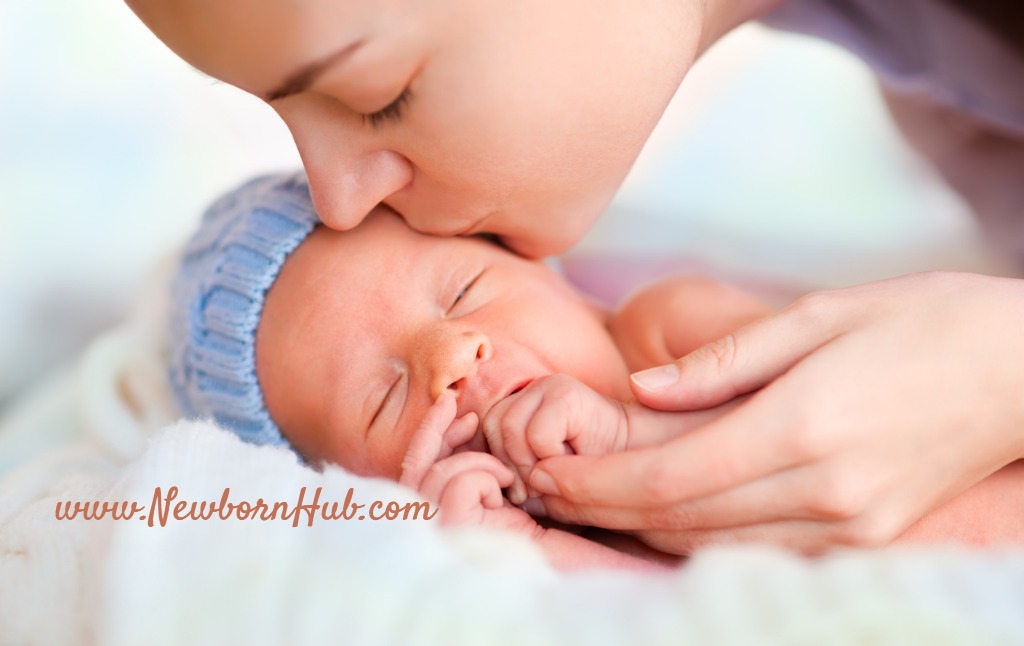


New! Comments
Have something to say about what you just read? Leave me a comment in the box below :)